#WomensMonth: Vhuhwavho Matibe, "Love yourself. Celebrate yourself. Pursue all your passions!"

Vhuhwavho Matibe shares her journey as a data scientist at Telkom Consumer.
Can you tell us a bit about yourself?
I am a young Venda woman with a passion for numbers. My academic background is in Pure Mathematics and my career revolves around data. I am currently employed as a data scientist at Telkom Consumer. I enjoy the company of people, so I mostly spend my time with both family and friends.
You're a data scientist at Telkom Consumer. Tell us more about your role here
As a data scientist my role involves translating data into actionable insights that can be used for decision-making by the business. It requires both technical and soft skills, since I am expected to be just as good at building a predictive model as I am in explaining the results (storytelling and selling).
Do you have any role models? If so, who?
I look up to women who are making waves in the technology industry as well as in business. One such woman is Amanda Dambuza, whom amidst all the struggles she came across growing up, has become one of the most influential voices and a founder of her own IT company.
You have a successful career spanning over x years. Tell us about your journey.
I started off as an intern in Data and Information Architecture and Management whilst I was pursuing my M.Sc in Mathematics in 2016. This was my introduction to the world of data as I gained knowledge in areas such as data quality, data governance, data modelling and data architecture.
However, after two years in this space, I wanted to be able to analyse, visualize and build models out of data, with the goal of bringing meaning to data and having an influence on business decision making. I then made the career switch in 2018, which was the beginning of my journey at Telkom and I have only learned and grown ever since.
Are South African women getting enough of a chance to shine in the technology industry? If not, what needs to be done?
Slowly but surely. Technology is still very much a male dominated industry. Because there isn’t enough representation both at the top and at entry level we still need to continue motivating and sponsoring young girls in pursuing careers in STEM.
Could you list a few, if any, specific challenges females face in this industry? How do women overcome these challenges?
There is hardly any balance in the team; teams generally have more men than women. Therefore, I continue advocating for females to be employed whenever there are job openings in the team.
Some male team members can sometimes expect you to play the role of organising and admin on the basis of your gender. I made it clear from the get go, so that both male and female teammates can play that role interchangeably.
Some huge projects that require a lot of technical expertise are generally assigned to men. We need to start trusting that women are just as capable and allocating the very same projects to them.
You're a successful woman in the tech industry. How do you keep a work-life balance?
I don’t think I have fully struck the balance as yet, I sometimes find myself opening my laptop at 9pm or on a Saturday morning.
What can governments do to help drive female leadership in SA?
Government can open more opportunities for women to grow and develop as leaders, and also support programs that focus on mentorship and sponsorship to the girl child.
How is Telkom empowering women entrepreneurs in building successful businesses?
Telkom currently has a program; the Female Leadership Development Programme which aims at developing female employees across the different BU’s and roles into becoming leaders in their specific fields.
How do you think South Africa can help in the fight against GBV?
By focussing on the perpetrators and not the victims. At this point, women are tired of being made to feel like any violence against them is their own fault. There needs to be de-normalisation of any forms of violence against the female by a male from a very young age.
What advice do you have to share with the future generation of businesswomen?
So many women have and are already paving the way, there are no limits to what can be achieved.
Do you have any words of encouragement for all the women out there?
Love your beautiful self, celebrate yourself, and be bold enough to pursue all your passions!



























